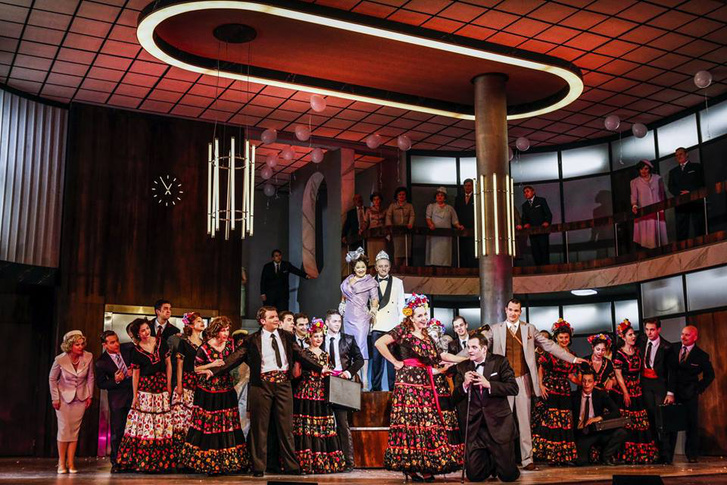
Bluebeard at the Operetta
Glass Slipper at József Attila
At the conclusion of Offenbach’s Die Rheinnixen (The Rhein Fairies, now playing at the Erkel Theater), the heroine Armgard suggests that all the tragedy was just a bad dream. As the producers argue in the program, this makes it possible for the characters to move on from calamity; it offers hope of breaking with the past and building a brighter future. At the same time, however, she is called upon to reconcile with her fiancé and her rediscovered father, the same men who allowed her to be victimized by drunken, lusty soldiers. This degree of forgiveness strains our credulity.
A similar conclusion occurs in Offenbach’s Kékszakáll (or Bluebeard), which has just premiered at the Operetta Theater. Just as the action descends into a huge melee, like something out of a Bud Spencer film, the senator character calls for a general amnesia. The ending is far more palatable on this occasion due to the farcical nature of the piece.
To call Kékszakáll grotesque would be an understatement. Operetta, as a genre, practically invites absurdity. (This is true even of the classic examples, such as The Merry Widow.) Here, however, we have a serial killer billionaire (played with pale, vampiric creepiness by Donát Varga) and a senator with a similar propensity for having his underlings killed. The fact that these two are powerful men who can act with impunity gives the work a satiric strain.
Of course, this may also be the result of the Hungarian adaptation. In the original, the poor Parisian flower girl turns out to be the king’s abandoned daughter. This time round, Fleurette (Luca Bojtos) is a clumsy secretary in a stylized 1950s-era office building where sexual harassment is not a concept, just a facet of the work environment. In this version, the senator’s daughter (not the king’s) actually dies in a plane crash, and the secretary agrees to impersonate her for social and financial gain. The office’s nymphomaniac cleaning lady (Barbara Bordás) wins the organization’s beauty pageant, whereupon she receives a proposal from Mr. Bluebeard, the billionaire boss. Nevertheless, when Bluebeard spots Fleurette masquerading as the debutante Hermia, he vows to poison his new bride and take Fleurette as his seventh wife, on the very evening her “parents” plan for her to wed Prince Saphir (Attila Dolhai). All this is topped off by a Mexican dance routine in the last scene, where the victims of the senator and the billionaire perform in colorful costumes and grinning skeletal masks.
The cast is uniformly spirited and enthusiastic, which goes a long way to selling this bizarre and unsettling material. László Szacsvay, a long-time member of the Katona József Company, mines his vast experience with absurd theatre in his portrayal of the senator. The result is an almost classic performance. While his comic timing is superb, his musical rhythm needs more work. Hats off to director Kriszta Székely for her bold imagining of this work! While some of Noémi Kulcsár’s choreography has not clicked yet, it may improve with time.
It may seem unrelated at first, but please hear me out. Molnár Ferenc’s Üvegcípő (The Glass Slipper) receives an attractive and traditional staging at the József Attila Theatre.
Written in 1924, Glass Slipper ranks among Molnár’s best plays. It is exceptionally well made, effortlessly evoking the milieu of the period’s lower-middle-class boarding houses. There are scenes of powerful drama, and yet they never overwhelm the lighthearted comedy or the compassion shown for all the characters. As the title suggests, this play is a Hungarian version of the Cinderella story, but here the heroine is Irma, an orphaned maid who pines for the middle-aged man that she serves, the gruff carpenter Lajos Sipos.
There are parallels to the playwright’s life as well. At the time of the play’s composition, Molnár was married to one of the most celebrated actresses of the time, Sári Fedák. Soon afterward, he divorced her to marry another actress, Lili Darvas, who was twenty-five years younger and coincidentally played the role of Irma in the Budapest premiere of Glass Slipper.
Still fresh in the minds of audiences is the classic musical production from 1962 (later televised), starring Edit Domján and Gábor Agádi, which was characterized by a broad comedic style. More recently, in 2005, Örkény Színház gave the play a more serious, realistic treatment, practically a psychological case study, featuring Gabriella Hámori and László Gálffi in the lead roles. This production at József Attila Színház clearly has the 1962 version in mind. Balázs Horesnyi’s sets are lovingly detailed and make no concessions to the modern trend of minimalism. Some of the staging also recalls the 1962 version, as does Dóra Létay’s cool performance as the landlady Adél, absolutely different from Anikó Für’s vehement interpretation at the Örkény.
Károly Nemcsák makes the role of Sipos his own by playing him with a slow, bear-like physicality. He is harsh towards Irma, but he is also flattered by her attention, and his instinct to protect her betrays his burgeoning love for the girl. As Irma, Réka Thália-Fekete has an appealing presence, but her sunny demeanor makes the character’s devotion to the older Sipos harder to swallow. She is too good to be true. Without Edit Domján’s broad comedy or Gabriella Hámori’s near pathological loneliness, the character begins to resemble an older man’s fantasy. In short, it straineth credibility.
A bejegyzés trackback címe:
Kommentek:
A hozzászólások a vonatkozó jogszabályok értelmében felhasználói tartalomnak minősülnek, értük a szolgáltatás technikai üzemeltetője semmilyen felelősséget nem vállal, azokat nem ellenőrzi. Kifogás esetén forduljon a blog szerkesztőjéhez. Részletek a Felhasználási feltételekben és az adatvédelmi tájékoztatóban.




